Bernedoodle vs. Golden Retriever Breed Guide – What Is The Best Breed For You

When you’re looking for a dog to add to the family, you wonder what kind of dog would be best. You need to consider the needs of your family, how the dog will interact, and the space you need to keep your pet.
The Bernedoodle and the Golden Retriever are great dogs for families. Below you will find a comparison between the two to help you make the best choice for yourself and your family.
Key Similarities
Both dogs are large dogs, weighing in at about the same weight. The Bernedoodle and the Golden Retriever come from litters that range from five to ten puppies. Both breeds are easy to train, are new owners, and are kid friendly. Both Bernedoodles and Golden Retrievers require moderate maintenance and adequate exercise.
Key Differences
The Bernedoodle is about 7 inches shorter than a Golden Retriever and was bred to be a companion dog. The Golden Retriever is approximately 7 inches taller than the Bernedoodle and was bred as a gun dog.
Your Bernedoodle will live between 12 and 15 years, while your Golden Retriever will live between 10 and 12 years. A Bernedoodle is considered to be one of the hypoallergenic dogs. However, no dog is truly hypoallergenic and has minimal shedding. A Golden Retriever is not hypoallergenic and has moderate shedding.
Pros of Owning a Bernedoodle
A Bernedoodle has a longer life span by a few years and is a calmer breed. The Bernedoodle dog can come in three different sizes and three different coats. Because of the choice of sizes, the dog can adjust to living in a house or an apartment depending on the dog you choose.
Pros of Owning a Golden Retriever
Golden Retrievers are very patient dogs, making them the perfect dog for people who have children. These dogs love to be with and around their master and be involved in the goings-on in the household. The Golden Retriever loves to run around holding items in their mouth, and they learn tricks quickly.
Overall Comparison:
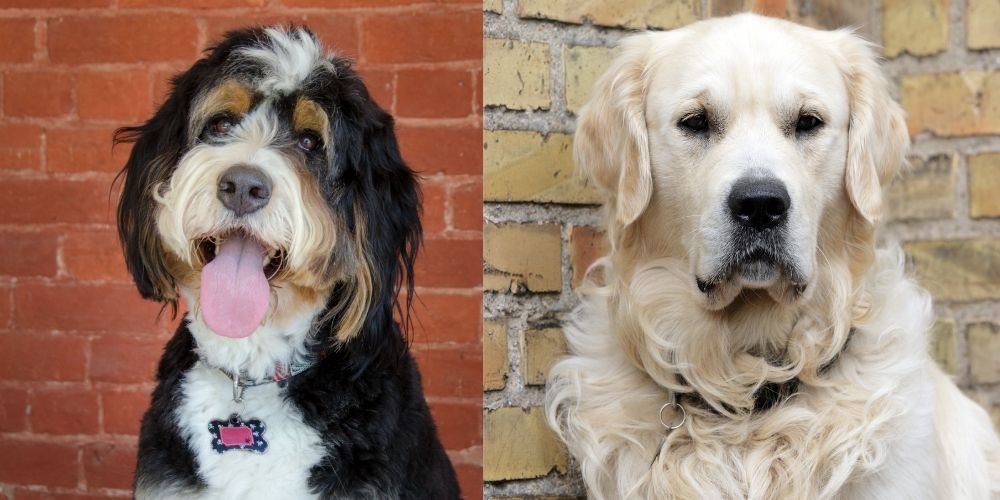
Both of these breeds of dogs are loyal and friendly. They love their families and will go to great lengths to please them. The decision to adopt a dog into your family is up to you. Hopefully, these facts about both these dogs will help to make your decision easier.
All About the Bernedoodle
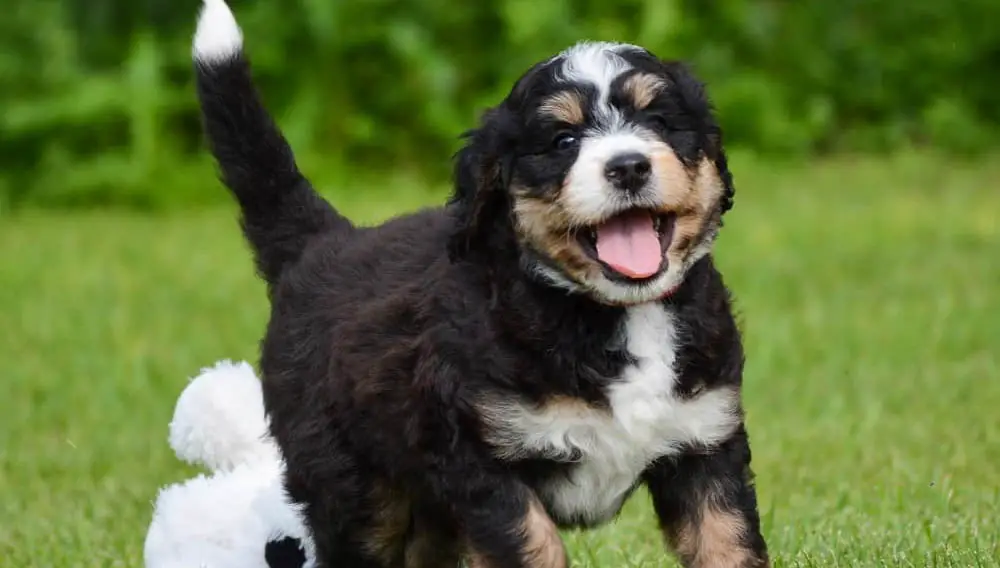
The Bernedoodle originated in Canada and is a cross between a Bernese Mountain Dog and a Standard Poodle.
All About the Golden Retriever

The Golden Retriever came from Scotland and originated in the 1800s. The breed was designed for hunting ducks and waterfowl.
Golden Retrievers are excellent hunting dogs but are wonderful family dogs as well.
History:
The Bernedoodle is a 50/50 mix of Purebred Poodle and a purebred Bernese Mountain dog.
The breed has existed for a while, but the first official cross breed came from SwissRidge Kennels by Sherry Rupke.
The first official Bernedoodle was achieved in 2003, and she has an entire breeding program now for this hybrid.
This breed is not one officially recognized by the AKC, so there isn’t a set in stone breed standard.
However, there are three sizes of Bernedoodles, and there are at least three generations.
Size And Appearance:
Bernese Mountain Dogs are large dogs. A Standard Bernedoodle can weigh between 55 to 90 pounds and are between 23 to 29 inches tall.
A miniature Bernedoodle can weigh between 25 to 49 pounds and is between 18 to 24 inches tall.
There are also toy-sized Bernedoodles which are 75% miniature Poodle and only 25% Bernese Mountain dog. These small Bernedoodles weigh about 10-24 pounds are about 12 to 17 inches tall.
A Bernedoodles coat can be tri-colored of black, brown, and white, or mostly black. The coat on this breed is either curly or wavy. These dogs have long ears, a triangle-shaped muzzle, and button eyes. The tail is usually long and bushy.
Lifespan:
The Bernedoodles lifespan is around 12 to 15 years, with the miniature version having a longer lifespan of up to 18 years.
Guard Dog Or Family Pet:
If you want a guard dog, the Bernedoodle isn’t going to be it. This breed is much too friendly to be a guard dog.
But as a family pet, this dog is an excellent choice. Bernedoodles love to be around children and will be vigilant around them.
In fact, your Bernedoodle is pet-friendly and will bond with just about any other pet you have. Just remember to socialize your pet from an early age, and he’ll get along well.
History:
The British lords in Scotland loved hunting and needed an excellent hunting dog.
So, the Golden Retriever was bred for that purpose. But these dogs are also well-behaved and naturally friendly, so they have become known as family-friendly dogs.
Size And Appearance:
These are large dogs between 20 to 25 inches in height and 55 to 75 pounds in weight.
Their coat is either straight or wavy, with the color being Golden, Light Golden, or Dark Golden.
Goldens move with a powerful, smooth gait with a feathery tail carried high. Heavy feathering is also across their chest, the backs of the dog’s legs, and the tail.
These dogs can be leaner and sporty or broad and denser in their physique.
Lifespan:
A Golden Retriever’s life span is between 10 to 12 years.
Guard Dog Or Family Pet:
A Golden Retriever can make a good guard dog. Because this breed isn’t naturally aggressive, though, it may require some training.
Also, since a Golden Retriever is a large dog, they can look very intimidating.
Because this breed is an intelligent breed, they can be taught to be a guardian for you and your family.
They know when something is wrong or when someone means to harm the family members. Because they are such loyal dogs, Golden Retrievers won’t run away when danger threatens.
But the downside is that Golden Retrievers aren’t barkers, so your dog may not alert you to the fact that there’s an intruder right away.
Plus, because being friendly is in its nature, the dog is more likely to stand behind you, not in front of you, if he isn’t trained to do so.
Basically, Golden Retrievers are family dogs but can be trained to be guard dogs if used with the command technique.
Bernedoodles In More Detail
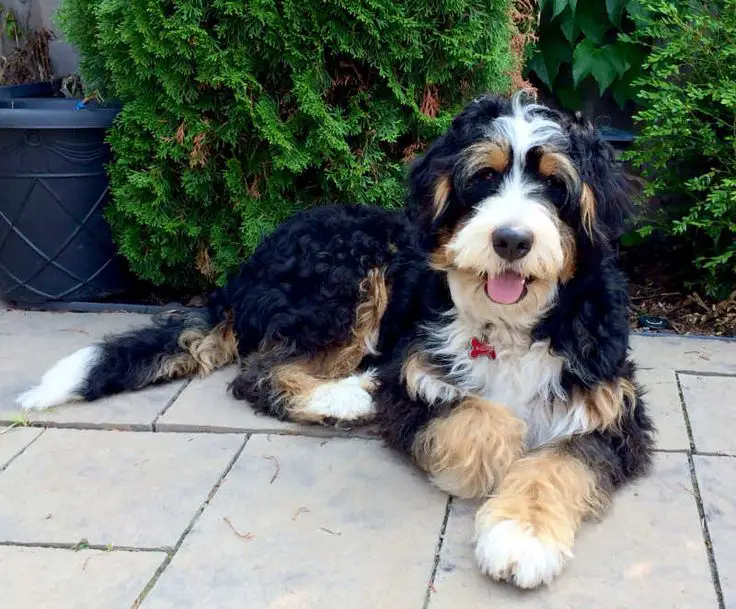
Temperament And Behavior:
Bernedoodles can have the best characteristics from their parents if the breeder is conscientious.
Your Bernedoodle can be sociable, friendly, playful, intelligent, and happy. But sometimes, the breeding doesn’t go as planned.
You can end up with the hyperness of a poodle or the stubbornness of the Bernese in your pup.
Training And Obedience:
Socialization and training are essential for this breed. Enrichment activities are recommended so your dog doesn’t get bored and starts with excessive barking or destructive chewing.
Exercise needs:
Your Bernedoodle is not overactive but is a calm dog. Usually, this breed carries the calm and gentle nature of the Bernese Mountain Dog, not the high energy level of the poodle. But your dog will need daily walks and your attention regularly.
Shedding, grooming, and maintenance:
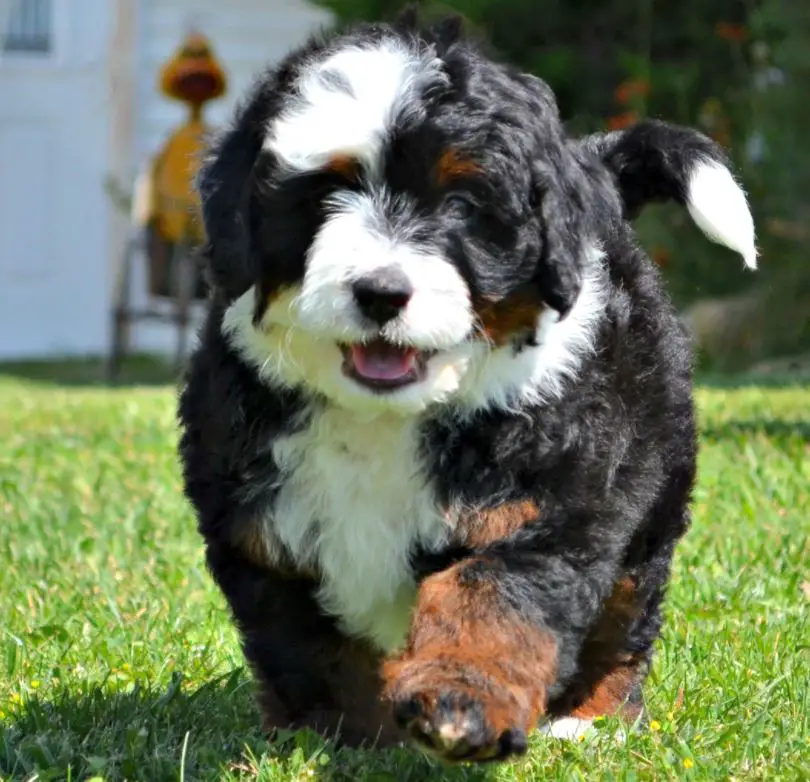
Your pup has a low-shedding coat with many advantages. But you will need to groom him regularly because of the curly coat. If you don’t brush him regularly, your dog will become matted or have tangled fur.
He will need to be brushed by you regularly three to four times a week. Your dog will also need to be professionally groomed every 2-3 months.
Health Issues:
There isn’t much information about Bernedoodles’ health issues because the breed is still so new. For example, the Bernese cancer rarely seems to affect the Bernedoodle.
But skin issues, elbow, and hip dysplasia, and eye issues are common. Also, hot spots tend to crop up as well as allergies. Make sure your breeder has definitely tested the parents and your puppy for eye issues and dysplasia.
Quick Facts:
The cost of a Bernedoodle is between $2500 to $6500 because of the high demand for the breed. If the color pattern is unique, your dog will cost even more.
This high-maintenance breed can cost you between $600 to $1000 every year to keep your dog looking his best.
These dogs are the perfect dog for seniors, kids, and individuals. These dogs are friendly, social, cuddly, and loving.
Golden Retrievers In More Detail
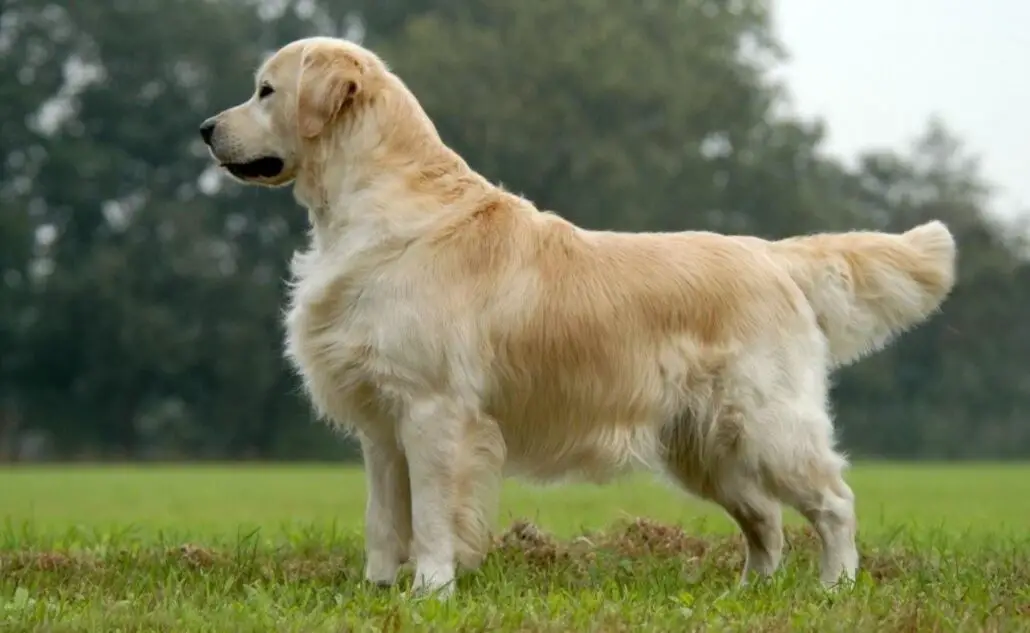
Temperament And Behavior:
Golden Retrievers are naturally well-behaved and friendly. Their temperament is playful, gentle, and outgoing. Plus, this breed is intelligent and devoted to its family.
A Golden Retriever gets along with other animals. However, these dogs do exuberant jumps on people when young. Plus, this breed does tend to mouthiness and likes to carry things around.
Training and obedience:
A Golden Retriever has a puppy frame of mind until he is over three years old. Early training is essential so you can instill good manners and calmness.
Even if he is eager to please, your dog will be distracted by the wonderful new sights and smells, so patience is a must.
Exercise Needs:
These dogs are from the sporting class, so they need exercise. If your dog can’t vent his energy and you find him interesting things to do, then he’ll find them. This breed has an extremely high energy level and a high exercise level.
An hour of exercise at least will help keep your dog’s exuberance under control. After that, your dog will love to retrieve stuff and bring back just about anything thrown to him.
Shedding, grooming, and maintenance:
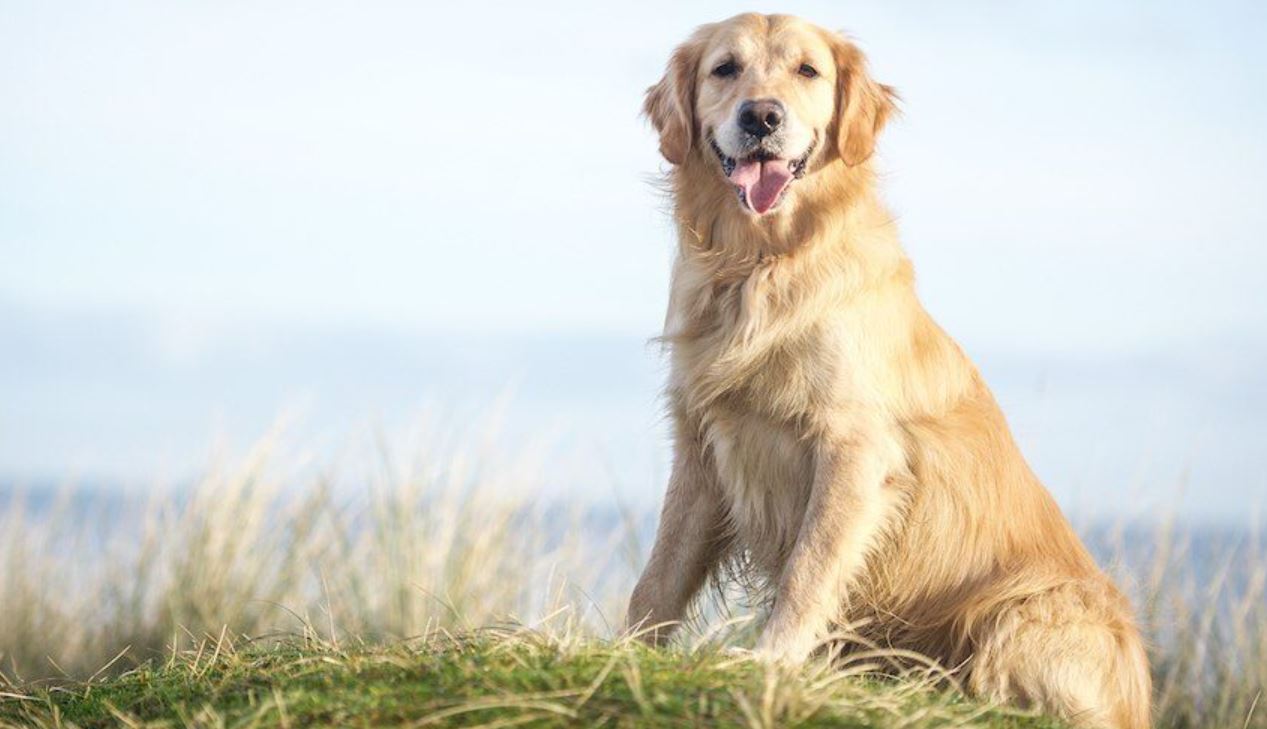
Golden retrievers shed a lot and often. They require regular brushing to keep ahead of the hair shedding.
Because the breed is a hunting and waterfowl dog, the outer coat is dense and will repel water.
You will regularly need to brush and comb your dog to avoid his coat getting matted and tangled. Some dogs of this breed have a medium-length coat that isn’t as hard to groom. Other dogs have a heavier coat with lots of feathering.
Plus, Goldens need to be clipped and scissored occasionally, so a trip to the groomers may be necessary to keep your dog sanitary. Keeping nails trimmed is also a part of the grooming. These dogs shed moderately in the winter and summer but heavily in the spring and fall.
Because this breed has fold-over ears, they are prone to ear infections. The ears create an environment for bacteria and fungus to grow. It appears as black dirt-looking particles with a terrible odor. Simply gently wipe the outer ear with a cotton ball that’s been dampened with pH-balanced ear cleaner.
Health issues:
Golden Retrievers are prone to cancer, heart problems, skin allergies, eye defects. Plus, they gain weight easily, so overfeeding should not be done. In addition, they are susceptible to bloat, hypothyroidism, and hip dysplasia.
Quick Facts:
These dogs have a distinctive doggy odor and produce a lot of dander.
The breed is a good match for children, other dogs, cats, families, and seniors. They are excellent dogs for first-time pet owners, and these dogs love water.
The cost of a Golden Retriever is about $500.


